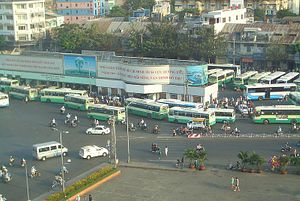An ambitious plan to clear the streets of Ho Chi Minh City (HCMC) and return the sidewalks to pedestrians virtually whimpered to death this month with the resignation of its fiercest and most controversial proponent. Comments made around the matter have suggested the failure of the program is linked to the business elite and the political class which supports them.
The plan, announced in 2016 and launched in February last year, was aimed at turning District 1 in central Ho Chi Minh City into “Little Singapore,” long seen as an aspiration for city planners in parts of the region. Authorities got to work clearing sidewalks of debris, unapproved structures, and street vendors, with the intention of returning the paths to pedestrians. But the snap resignation of District 1 Vice Chairman Doan Ngoc Hai earlier this month underscores the scale of the project and the difficulties in balancing demands of residents and businesses as HCMC looks towards Singapore.
After taking the role, Hai said he would quit if he failed and said as much after announcing his resignation earlier this month. As the main face of the campaign, he was largely supported by the community keen to get back their streets. But mounting coverage of emotional street vendors protesting as authorities confiscated equipment and issued fines projected an image of a government at war with the city’s working class. Hai had reportedly received death threats from vendors last year, and city leadership intervened with the program asking Hai to step down as the public leader and promising the taskforce would only be deployed in instances where a complaint had been made.
The project itself is largely seen as failed and has been all but abandoned. Areas in which the sidewalks were effectively cleared have now become space for the city’s cars and motorbikes, while HCMC’s thriving street food scene had been relocated to designated spots in District 1. The resignation speaks to an issue much larger in Vietnam than the mere misuse of sidewalks. Hai’s letter complained of the project being hamstrung by powerful business interests who have money tied up in operating on the street, and, more pressingly, a political class siding with them over fully supporting the initiative.
In the short-term, city officials will likely go back to the drawing board. City Deputy Chairman Tran Vinh Tuyen stressed the complexities of the issue during a meeting following Hai’s resignation. “Sidewalks are like golden land. Everyone is eyeing them and if we loosen control just a bit they will be snapped up by one person or another,” Tuyen said, as reported by VN Express. But for now, pedestrians will have to again share the paths with vendors and, until March, with car parks, up to the point that a resolution can be found – though there are now strings attached. Tuyen said vendors and car park attendants will be responsible for maintaining the area in which they operate.
But in the long-term, Vietnam’s largest city will have to undergo a more fundamental and awkward soul-searching as it looks towards efforts to modernize in a way which benefits residents, particularly those reliant on informal economy work and family-run businesses, but still realizes the ambitious so-called ‘Little Singapore’ plan. Much of this comes down to Hai’s accusation that city officials have been involved in undermining his taskforce. Hai complained that without the full and unqualified support of the political elite, the taskforce would fail. Sure enough, it did.
With Vietnam’s much publicized crackdown on corruption throughout the political and business class still ongoing, the long running Ho Chi Minh City sidewalk saga shows just how much work is to be done in reforming leadership at every level, and how urgently that sort of effort is needed. While Hai’s allegations are just that at this stage, it does suggest it could be more than just the streets which need cleaning up in Ho Chi Minh City.

































